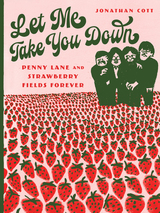5 books about Weimar Germany
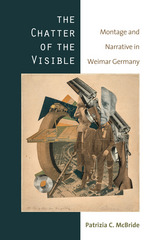
The Chatter of the Visible
Montage and Narrative in Weimar Germany
Patrizia C. McBride
University of Michigan Press, 2016
The Chatter of the Visible examines the paradoxical narrative features of the photomontage aesthetics of artists associated with Dada, Constructivism, and the New Objectivity. While montage strategies have commonly been associated with the purposeful interruption of and challenge to narrative consistency and continuity, McBride offers an historicized reappraisal of 1920s and 1930s German photomontage work to show that its peculiar mimicry was less a rejection of narrative and more an extension or permutation of it—a means for thinking in narrative textures exceeding constraints imposed by “flat” print media (especially the novel and other literary genres).
McBride’s contribution to the conversation around Weimar-era montage is in her situation of the form of the work as a discursive practice in its own right, which affords humans a new way to negotiate temporality, as a particular mode of thinking that productively relates the particular to the universal, or as a culturally specific form of cognition.
[more]
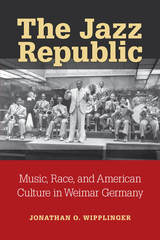
The Jazz Republic
Music, Race, and American Culture in Weimar Germany
Jonathan O. Wipplinger
University of Michigan Press, 2017
The Jazz Republic examines jazz music and the jazz artists who shaped Germany’s exposure to this African American art form from 1919 through 1933. Jonathan O. Wipplinger explores the history of jazz in Germany as well as the roles that music, race (especially Blackness), and America played in German culture and follows the debate over jazz through the fourteen years of Germany’s first democracy. He explores visiting jazz musicians including the African American Sam Wooding and the white American Paul Whiteman and how their performances were received by German critics and artists. The Jazz Republic also engages with the meaning of jazz in debates over changing gender norms and jazz’s status between paradigms of high and low culture. By looking at German translations of Langston Hughes’s poetry, as well as Theodor W. Adorno’s controversial rejection of jazz in light of racial persecution, Wipplinger examines how jazz came to be part of German cultural production more broadly in both the US and Germany, in the early 1930s.
Using a wide array of sources from newspapers, modernist and popular journals, as well as items from the music press, this work intervenes in the debate over the German encounter with jazz by arguing that the music was no mere “symbol” of Weimar’s modernism and modernity. Rather than reflecting intra-German and/or European debates, it suggests that jazz and its practitioners, African American, white American, Afro-European, German and otherwise, shaped Weimar culture in a central way.
[more]

Justice Imperiled
The Anti-Nazi Lawyer Max Hirschberg in Weimar Germany
Douglas G. Morris
University of Michigan Press, 2005
"This book reads like a legal thriller; it will leave you thinking about the nature of justice and inspired by the human spirit."
-Sister Helen Prejean
Justice Imperiled is the story of the brilliant lawyer Max Hirschberg, one of Germany's most courageous defenders of justice in the face of Hitler's rise to power.
Hirschberg lived an extraordinary life at a defining moment in German and European history. By the time he fled Nazi Germany in 1934, he had argued a series of cases in Munich's courtrooms that shed light on the history of political justice in pre-Nazi Germany and, by extension, the miscarriage of justice in all Western democracies.
Hirschberg was a rare figure: he fought for cases that reflected the new democracy rather than the old monarchy, that valued equality rather than hierarchy, and that showed respect for workers as well as aristocrats.
Throughout the Weimar period Hirschberg squared off in court against Munich's conservatives, reactionaries, and Nazis-twice facing Hitler himself. As he litigated politically charged disputes, he also began fighting to reverse the criminal convictions of innocent defendants and to study what mistaken verdicts teach us about the criminal justice system as a whole.
In a unique blend of biography and courtroom drama, Justice Imperiled captures the excitement of Hirschberg's actual cases and presents legal battles that still rage, in different circumstances, to this day.
-Sister Helen Prejean
Justice Imperiled is the story of the brilliant lawyer Max Hirschberg, one of Germany's most courageous defenders of justice in the face of Hitler's rise to power.
Hirschberg lived an extraordinary life at a defining moment in German and European history. By the time he fled Nazi Germany in 1934, he had argued a series of cases in Munich's courtrooms that shed light on the history of political justice in pre-Nazi Germany and, by extension, the miscarriage of justice in all Western democracies.
Hirschberg was a rare figure: he fought for cases that reflected the new democracy rather than the old monarchy, that valued equality rather than hierarchy, and that showed respect for workers as well as aristocrats.
Throughout the Weimar period Hirschberg squared off in court against Munich's conservatives, reactionaries, and Nazis-twice facing Hitler himself. As he litigated politically charged disputes, he also began fighting to reverse the criminal convictions of innocent defendants and to study what mistaken verdicts teach us about the criminal justice system as a whole.
In a unique blend of biography and courtroom drama, Justice Imperiled captures the excitement of Hirschberg's actual cases and presents legal battles that still rage, in different circumstances, to this day.
[more]
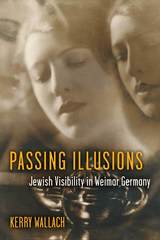
Passing Illusions
Jewish Visibility in Weimar Germany
Kerry Wallach
University of Michigan Press, 2017
Weimar Germany (1919–33) was an era of equal rights for women and minorities, but also of growing antisemitism and hostility toward the Jewish population. This led some Jews to want to pass or be perceived as non-Jews; yet there were still occasions when it was beneficial to be openly Jewish. Being visible as a Jew often involved appearing simultaneously non-Jewish and Jewish. Passing Illusions examines the constructs of German-Jewish visibility during the Weimar Republic and explores the controversial aspects of this identity—and the complex reasons many decided to conceal or reveal themselves as Jewish. Focusing on racial stereotypes, Kerry Wallach outlines the key elements of visibility, invisibility, and the ways Jewishness was detected and presented through a broad selection of historical sources including periodicals, personal memoirs, and archival documents, as well as cultural texts including works of fiction, anecdotes, images, advertisements, performances, and films. Twenty black-and-white illustrations (photographs, works of art, cartoons, advertisements, film stills) complement the book’s analysis of visual culture.
[more]
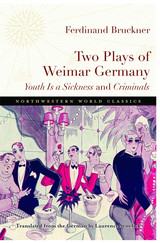
Two Plays of Weimar Germany
Youth Is a Sickness and Criminals
Ferdinand Bruckner, Translated from the German by Laurence Senelick
Northwestern University Press, 2018
Two Plays of Weimar Germany offers new translations, by the renowned theater scholar and translator Laurence Senelick, of popular works by the playwright Ferdinand Bruckner: Youth Is a Sickness (Krankheit der Jugend) and Criminals (Die Verbrecher).
Though his fame was later eclipsed by peers such as Bertolt Brecht, Bruckner was the celebrity dramatist of his time, and a new generation of readers is discovering his groundbreaking plays known for their strong cultural critique and unflinching portrayals of social ills, outcasts, and misfits. Youth Is a Sickness (1924) explores the lives of Germany's "lost generation," those who grew up during and after the cataclysm of the First World War, devoid of hope and ideals, lost in a haze of sex and drugs. Criminals (1926) traces several court cases about a failed double suicide, theft, abortion, and homosexual blackmail, controversial topics for the audience of its time and even today. Its innovative staging and interwoven storylines illuminate the imposed social tensions and legal injustice faced by the characters.
In this expert translation, readers can see Bruckner as a public intellectual, a man committed to commenting on the fate of Germany; humane values; and the past, present, and future in his work. With an introduction by the translator, this volume will be the definitive version for readers, actors, playwrights, and scholars.
Though his fame was later eclipsed by peers such as Bertolt Brecht, Bruckner was the celebrity dramatist of his time, and a new generation of readers is discovering his groundbreaking plays known for their strong cultural critique and unflinching portrayals of social ills, outcasts, and misfits. Youth Is a Sickness (1924) explores the lives of Germany's "lost generation," those who grew up during and after the cataclysm of the First World War, devoid of hope and ideals, lost in a haze of sex and drugs. Criminals (1926) traces several court cases about a failed double suicide, theft, abortion, and homosexual blackmail, controversial topics for the audience of its time and even today. Its innovative staging and interwoven storylines illuminate the imposed social tensions and legal injustice faced by the characters.
In this expert translation, readers can see Bruckner as a public intellectual, a man committed to commenting on the fate of Germany; humane values; and the past, present, and future in his work. With an introduction by the translator, this volume will be the definitive version for readers, actors, playwrights, and scholars.
[more]
READERS
Browse our collection.
PUBLISHERS
See BiblioVault's publisher services.
STUDENT SERVICES
Files for college accessibility offices.
UChicago Accessibility Resources
home | accessibility | search | about | contact us
BiblioVault ® 2001 - 2024
The University of Chicago Press




